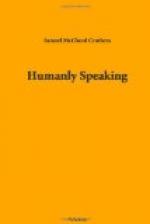The trouble is that the literary man finds that this does not afford exciting material for a best seller. So he must invent hazards to make the game interesting to the spectators. In a story the course of true love must not run smooth or no one would read it. The old-time romancer brought his young people through all sorts of misadventures. When all the troubles he could think of were over, he left them abruptly at the church door, murmuring feebly to the gentle reader, “they were happy ever after.”
The present-day novelist is offended at this ending. “How absurd!” he says. “They are still in the early twenties. The world is all before them, and they have time to fall into all sorts of troubles which the romanticist has not thought of. Middle age is just as dangerous a period as youth, and matrimony has its pitfalls. Let me take up the story and tell you how they didn’t live happily ever afterwards, but, on the contrary, had a cat-and-dog life of it.”
Now I would pardon the novelist if he were perfectly honest and were to say, “Ladies and gentlemen, I am trying to interest you. I have not the skill to make a story of placid happiness interesting. So I will do the next best thing. I will tell you a story of a different kind. It is the picture of a kind of life that is easier to make readable.”
In making such a confession he would be in good company. Even Shakespeare, with all his dramatic genius, confessed that he could not avoid monotony in his praise of true love. Its ways were ways of pleasantness, but did not afford much incentive to originality.
“Since all alike my songs and praises
be
To one, of one, still such, and ever so.
Kind is my love to-day, to-morrow kind,
Still constant in a wondrous excellence;
Therefore my verse to constancy confined,
One thing expressing, leaves out difference.
‘Fair, kind, and true’ is
all my argument,
‘Fair, kind, and true’ varying
to other words;
And in this change is my invention spent.”
But the novelist, when he takes himself too seriously as the man who is to show us “life as it is,” is not content to acknowledge his limitations. When he pictures a situation in which there is nothing but a succession of problems and misunderstandings, he asks us to admire his austere faithfulness. Faithful he may be to his Art, as he understands it, but he is not faithful to reality, unless he is able to make us see ordinary people in the act of enjoying themselves.
The most obvious thing in life is that people are seldom as unhappy as their circumstances would lead us to expect. Nobody is happy all the time, and if he were, nobody is enough of a genius to make his undeviating felicity interesting. But a great many people are happy most of the time, and almost everybody has been happy at some time or other. It may have been only a momentary experience, but it was very real, and he likes to think about it. He is excessively grateful to any one who recalls the feeling. The point is that the aggregate of these good times makes a considerable amount of cheerfulness.




